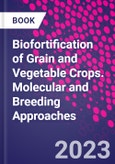Biofortification of Grain and Vegetable Crops: Molecular and Breeding Approaches is a comprehensive overview of important food crops whose vitamin and mineral enhancement can contribute significantly to improved food and nutrition security. Providing the latest information on crops including cereals, oilseeds, legumes and vegetables, this book provides details of agronomic and molecular resources for enhanced mineral production. Each chapter focuses on a specific food crop and the unique opportunities offered by each through breeding practices. This will be a valuable resource for researchers, academics and those in industry who are exploring biotechnological approaches as a powerful tool to combat malnutrition.
Please Note: This is an On Demand product, delivery may take up to 11 working days after payment has been received.
Table of Contents
1. GMO for Crop Biofortification2. Maize biofortification in the 21st century
3. Biofortified rice in zero hunger challenge: current status, problems and future opportunities
4. Agronomic and Genetic Biofortification of wheat: progress, limitations and prospects
5. Barley biofortification for food security: Challenges and future prospects
6. Biofortified Sorghum: A prospectus of combating malnutrition
7. Biofortification of Soybean to enhance micro-nutrients
8. Biofortification of Chickpea: Genetics, Genomics and Breeding Perspectives
9. Biofortification potential of neglected protein legumes for combating hidden hunger in resource-poor countries
10. Biofortification of Brassicas for oil and quality improvement
11. Tomato Biofortification: Evidence and Tools linking Agriculture and Nutrition
12. Biofortified Carrots: Capitalizing Omics Tools
13. Biofortification of potato to reduce malnutrition
14. Biofortified Sweetpotato: An Ideal source of mitigating hidden hunger
15. Cassava : A Potential candidate for biofortification exploration
16. Biotechnological overview of cauliflower for biofortification
17. Biofortified lettuce: A potential opinion to fight hunger
Authors
Muhammad Tehseen Azhar Associate Professor, Department of Plant Breeding and Genetics, University of Agriculture, Faisalabad, Pakistan.Dr. Muhammad Tehseen Azhar is working as Associate Professor at the Department of Plant Breeding and Genetics, University of Agriculture, Faisalabad-Pakistan, where his primary responsibility is teaching to graduate and post-graduate classes. Besides, his focus is screening and development of segregating population resulting in the development of several bulks of cotton with more yield and fibre traits. Dr Azhar has specific interest in the development of cotton germplasm having tolerance to biotic and abiotic stresses. These advanced strains of cotton have showed good performance for yield of cotton in national traits and those genotypes are suitable for cultivation in high temperature and water stress conditions. Being a Borlaug Alumnus, he worked with various cotton geneticists namely, Dr Richard Percy, Dr Lori L. Hinze and Dr Jame Frelichowsk at Texas A&M University and USDA-ARS, USA. Dr Azhar has completed various research projects funded by Higher Education Commission, Pakistan; CAS-PARB and Cooperation Organization Partnership for Science and Technology, China. Besides, Dr Azhar is Endeavour Alumnus and appointed as Adjunct Lecturer at the School of Plant Biology, UWA. Recently he is appointed as Adjunct Associate Professor, School of Agriculture Sciences, Zhengzhou University, Zhengzhou, China. Due to his consistency Dr Azhar is appointed as a Chair (20219-2021) of Germplam and Genetic Stock in International Cotton Genome Initiative (ICGI). He is winner of ASIA Young Scientist Innovation Gold Medal-2023 from International Cotton Researchers Association (ICRA), a sub-committee of International Cotton Advisory Committee (ICAC), Washington.
Muhammad Qadir Ahmad Assistant Professor, Department of Plant Breeding and Genetics, Faculty of Agricultural Sciences and Technology, Bahauddin Zakariya University, Multan, Pakistan.Dr. Muhammad Qadir Ahmad is working as an Assistant Professor at the Department of Plant Breeding and Genetics, Faculty of Agricultural Sciences and Technology, Bahauddin Zakariya University, Multan, Pakistan. He earned his PhD degree from the University of Agriculture, Faisalabad, Pakistan, in 2013. Additionally, he gained experience as a scholar at the Genomics and Gene Discovery Research Unit, Western Regional Research Center at the United States Department of Agriculture (USDA), California. Later, Dr. Ahmad worked as a research assistant at Xuzhou Institute of Agricultural Sciences/Xuzhou Sweetpotato Research Centre, Jiangsu, China, and he now holds the position of adjunct associate professor at this institute. He teaches different courses to undergraduate and postgraduate students of Plant Breeding and Genetics. He is actively involved in field and laboratory experiments, and over a period of time, he has screened wheat germplasm stocks against heat and drought stresses. He has also developed various breeding populations of wheat.
Iqrar Ahmad Rana Associate Professor, Center of Agricultural Biochemistry and Biotechnology (CABB), University of Agriculture, Faisalabad, Pakistan. Iqrar Ahmad Rana is Associate Professor at University of Agriculture in Faisalabad, Pakistan. He did his PhD in Applied Molecular Biology of Plants from the University of Hamburg in Germany. During his stay in Germany he learned molecular cloning, invitro regeneration and transformation of cereals. Furthermore, he learned basic techniques in molecular phytopathology. Coming back to Pakistan he started his research group at the Center of Agricultural Biochemistry and Biotechnology (CABB), University of Agriculture in Faisalabad, Pakistan. Since then he has developed disease resistant germplasm in wheat and sugarcane. Dr. Rana successfully developed 'inplanta' transformation replacing tissue culture in multiple crop plants like wheat, maize, cotton, and brassicas. Rana Muhammad Atif Assistant Professor, Department of Plant Breeding and Genetics, University of Agriculture, Faisalabad, Pakistan. Rana Muhammad Atif is Assistant Professor at Department of Plant Breeding and Genetics at the University of Agriculture in Faisalabad, Pakistan. He also heads the Chickpea Biotechnology Lab at the Centre for Advanced Studies in Agriculture & Food Security, a joint USAID and HEC funded project at University of Agriculture. He was a visiting scientist at "Feed the Future Innovation Lab for Climate Resilient Chickpea� headed by Professor Douglas Cook at the University of California, Davis, USA. His research focuses on breeding grain legumes for abiotic stress tolerance with enhanced nutritional values. For this purpose, he has been employing genomic and molecular approaches for the characterization and development of germplasm. His research programs are supported by Higher Education Commission, Pakistan, Punjab Agricultural Research Board and USAID.







